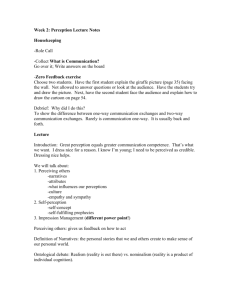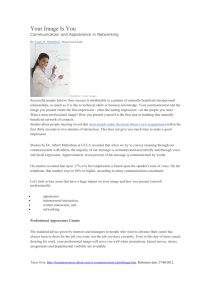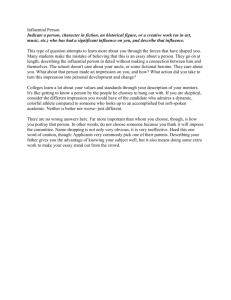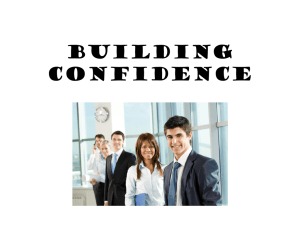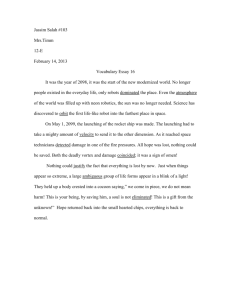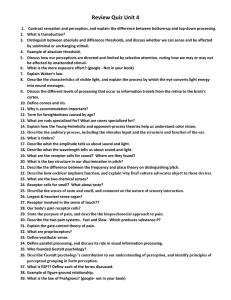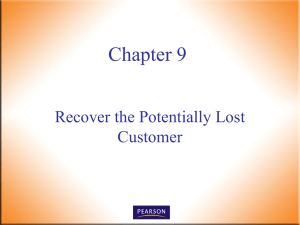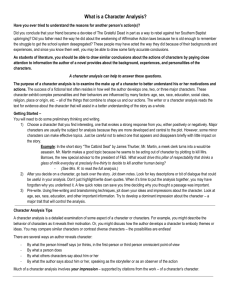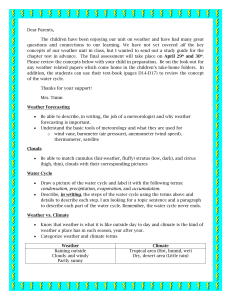First Impression -Slides- (for Department of Personnel)
advertisement
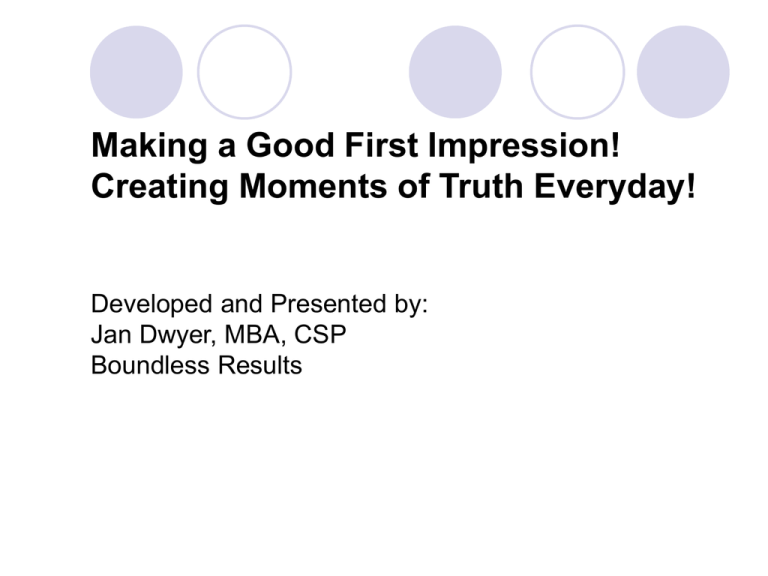
Making a Good First Impression! Creating Moments of Truth Everyday! Developed and Presented by: Jan Dwyer, MBA, CSP Boundless Results When you leave here today, you will be able to: •Create a positive and lasting first impression •Identify negative attitudes and behaviors •Discover practical ways you can project a positive image •See how you can enhance your agency’s image and credibility Introductions Think if a time when were you a customer and a first impression impacted your service experience. What was the result? Why are good first impressions so important in serving customers? What is your particular challenge in making and maintaining a positive first impression? The Importance of Positive First Impressions It takes 30 to 60 seconds for someone to make an immediate judgment about you In fact, people form up to 11 different opinions about you in those first 30 seconds. The great majority of those opinions are formed with the first 7 seconds Challenges to Customer Service 1. Different Perceptions 2. Different Expectations 3. Not dealing with the “human” side of the interaction 4. Not attentively listening 5. Not using “Supportive” Language 6. Not adapting your Style to the Style of others Perception “Virtually every problem in human relations stems from a difference in perception.” – Robert L. Katz Perception Our perceptions represent how we interpret or view what goes on around us. It is mostly a learned process through personal experiences and what is told to us by others. It is a filtering system Since we all have different backgrounds and past experiences, our individual perceptions differ. What do People want from their jobs? From Supervisors 1. High wages 2. Job security What do People want from their jobs? From Employees 1. Full appreciation of work done 2. Feeling of being in on things Perception FOULED UP FILES ARE THE RESULT OF FOOLISH NEGLECT AND FINISHED FILES ARE THE RESULT OF SCIENTIFIC STUDY COMBINED WITH THE EXPERIENCE OF MANY YEARS Count the F’s in the sentence Expectations are Perceptual! Expectations exist in the mind of the customer They are sometimes accurate and rational; sometimes not! They reflect an overall reaction to the whole buying experience The way customers evaluate their customer experience is how their expectations were met or exceeded! 50 Powerful Ideas You can Use to Keep Your Customers, by Paul R. Timm, Ph.D. Exceeding Expectations Breeds Loyalty Satisfied customers are those whose basic needs are met- they are NEUTRAL (Indifferent zone) To motivate customers to return, something more than adequate service must be experienced. Exceeding expectations leads to motivated, loyal customers 50 Powerful Ideas You can Use to Keep Your Customers, by Paul R. Timm, Ph.D. Ways to Exceed Expectations in Service Interactions Provide extra value (Value brings reassurance and comfort) Give better information (Explain things clearly) Provide “add-on’s” (Small, tangible ways you can give away to customers) Improve timing and follow-up (Immediate followthrough impresses customers) 50 Powerful Ideas You can Use to Keep Your Customers, by Paul R. Timm, Ph.D. Ways to Exceed Expectations in Service Interactions Make the last part of the transaction positive and motivating (Behaviorists say the end part of the transaction is what customers will remember) Reassure the customer’s decision to partner with you (Contact your customers after the sale to help with ‘buyer remorse’) 50 Powerful Ideas You can Use to Keep Your Customers, by Paul R. Timm, Ph.D. Ways to Exceed Expectations in Service Interactions Make service speed and customer convenience a priority (People value anything that saves them time and effort.) Have sufficient staff available Offer to handle the transactions efficiently Offer to handle additional details Make your website or phone handling efficient 50 Powerful Ideas You can Use to Keep Your Customers, by Paul R. Timm, Ph.D. Why is the Human Element so Important? Most customers will remember how they feel long after the interaction You are putting deposits in their account Most advanced service strategies focus on the “human” element Relationships in your own team When something happens We don’t know the full picture We don’t know the intent of the other person Most likely there was joint contribution We need to approach the other person with a “learning” mind frame We may not have realistic expectations (Adapted from Difficult Conversations, Douglas Stone) Task Task and “Human” Needs A given Human What can separate your agency from other agencies? Attentive Listening Exercise: •Divide in groups of three •One person share a story; the other person practices attentive listening. Third person observes •Listener to relay the story back to the speaker. Third person to provide feedback •Switch roles Using Supportive Language Use partnership Language Focus on what can be done Treat people as equals Focus on the behavior Use “I” messages Take responsibility and ownership Successful People Understand themselves and how their behavior affects others Understand their reactions to other people Know how to maximize on what they do well Have a positive attitude about themselves which causes others to have confidence in them Know how to adapt their behavior to meet the needs of other people and particular situations Behavioral Styles D I S C DOMINANCE INFLUENCE STEADINESS CONSCIENTIOUSNESS Loves challenges Persuades others Achieves stability Quality Focus Fear: Loss of Control Fear: Social rejection Fear: Change Fear: Criticism of work Limitations: Lack of concern for others Limitations: Disorganization Limitations: Overly willing to give Limitations: Perfectioninstic Culture of Service • Be clear on the vision of service • Inspire learning at every level • Align your systems to support this vision Standards of Service • How long it takes for a customer to be greeted? • How long it takes for the phone to be picked up? • How long it takes for an email request to be answered? • How long it takes for a customer to be served? Service Feedback • Are you hearing from your customers? • Do you make it easy for customers to provide feedback? • How do you handle negative feedback? • What do you do with the data? How do you communicate back to the customers that change has happened? Service Evaluation • How are you being evaluated on your service? • How often are you being evaluated on your service? • What are you taking into consideration in your evaluation system? (Comments from internal customers? Comments from your boss? Comments from external customers?) Service Recognition • How are people being recognized for outstanding service? • What processes can you put in place so recognition can be given by everyone? • How does your team or agency recognize champion service providers? • What is the criteria for outstanding service? Final Exam What are 5 things you can do to create a positive first impression with a customer? What is 1 way you can exceed your customer’s expectations? Expectations are “perceptual.” Share what this means as it relates to customer service. What is the difference between defensive and supportive language? What are some ways you can create a culture of service in your team? What is a moment of truth in service? Finish this sentence - It is virtually impossible to have personal power if you have a ____________ ________. Final Exam We need to connect with the customer in two levels _________ and __________. There were 6 challenges that prevents us from giving good service. Identify 3 of them. Our ___________represent how we interpret or view what goes on around us. Identify the four communication styles. Joint contribution – what does it mean? What is an internal customer? What is one thing you will work on in your service? All the best to you as you “turn on de-light” in service!
